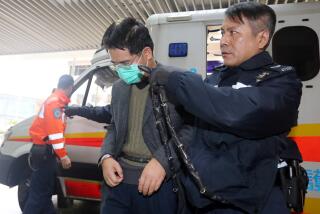Tears Flow as Victim’s Brother Testifies in Lindberg Penalty Trial
- Share via
SANTA ANA — Jurors wept Thursday as the brother of a young man stabbed to death on the tennis courts of Tustin High School because of his race described visiting the site repeatedly since then.
“I try to walk the path where he went and stand at the point where he went down,” 21-year-old Thai Ly said in a choked voice. “I try to imagine what he felt. I lay down where he was found and look to the sky and try to imagine his last thoughts, his last prayers as he lay dying.”
The brother’s testimony brought an emotional end to the prosecution’s case in the penalty phase of the trial for Gunner Lindberg of Tustin, convicted Tuesday of killing and robbing Thien Minh Ly, 24, in 1996 because he was Asian.
The conviction marked Orange County’s first death penalty case involving a hate crime, and was lauded as sending a powerful message against racism. The same Superior Court jury now must decide whether Lindberg should be executed or sent to prison for life without parole.
Thai Ly unsuccessfully fought back a steady stream of tears as he spoke about his brother. At one point, a concerned Judge Robert R. Fitzgerald suggested a break, but Ly insisted on continuing.
“It just hurts me so much,” he said. “It’s the worst pain I could ever feel. The day he died, my life just crumbled and the path before me disappeared.”
*
He said his brother, a graduate of UCLA and Georgetown University, “paved the way” for his younger siblings, who are both now in college. He told jurors about his brother’s “quest for knowledge,” his love of literature, especially the works of William Shakespeare, and his habit of listening to classical music to relax.
“Everything that I know and have right now,” Ly said, “I attribute it all to him.”
Ly also recalled driving across the country with his older brother when Thien Ly went to attend Georgetown University. He said they bonded spiritually on that trip, and he received invaluable guidance.
“I really cherish those days now,” he said. “I cannot convey how much he means to me in mere words.”
Thai Ly was studying for a midterm exam at UCLA when an uncle called him to tell him that his brother had been murdered.
“I felt blank,” he said. “My eyes were open, but I could not see anymore. I felt like I was nothing. I felt like I was dead myself. I felt like there was no life going through me anymore.”
He said his parents, Thi Ly and Dao Huynh, still cry almost every day and often sit in their dead son’s bedroom, which is still filled with his belongings. The family has attended each day of the trial, sitting in the back row of the small courtroom.
*
“They were so proud of my brother,” he said.
While many in the courtroom openly wept during the testimony, Lindberg, 22, sat expressionless, as he did when earlier witnesses testified Thursday about acts of violence he had committed against them.
Several of the witnesses had flown in from Missouri, where Lindberg had lived. Among them was Nicolas Gari, who said he had been riding a bicycle through a park in 1992, at age 11, when Lindberg fired a BB-gun at him, hitting first his baseball cap and then his neck.
A friend of Gari’s who witnessed the shooting, testified that Lindberg yelled, “I blew a hole in his neck!” Lindberg was found hiding in a trailer park.
A guard at a juvenile detention center in Missouri testified that Lindberg struck him for no reason the same year. Jeffrey Prewitt said that seconds after Lindberg said the words, “I love you, Grandmother,” and hung up a telephone, “He walked over to me and started hitting me.”
In 1995, two other men testified, Lindberg shot one of them in the arm and held a gun to the other’s head.
The defense is expected to present its case Monday, and the jury is expected to begin deliberations the same day. Defense attorney David Zimmerman would not say whether his client plans to take the stand.
The jury deliberated two days before convicting Lindberg of murder during an attempted robbery and while committing a hate crime--two “special circumstance” convictions that make him eligible for execution.
More to Read
Sign up for Essential California
The most important California stories and recommendations in your inbox every morning.
You may occasionally receive promotional content from the Los Angeles Times.













